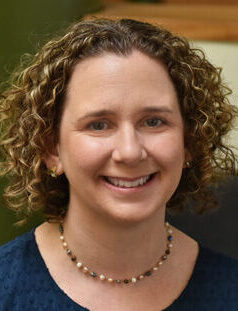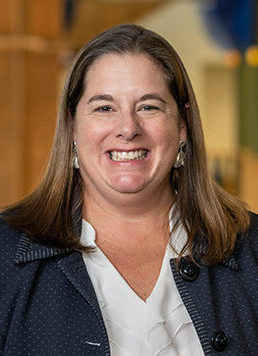
Kate Bauer is an epidemiologist whose research focuses on the social and behavioral determinants of obesity among children and adolescents. She is particularly interested the role of parents and families in children’s dietary intake and other weight-related behaviors, as well as how socio-ecologic stressors affect weight-related parenting, the family environment, and child behavior and weight. Dr. Bauer is an Associate Professor in the Department of Nutritional Sciences at the U-M School of Public Health. She earned a PhD in behavioral epidemiology from the University of Minnesota (2010), a Master’s of Science in Health and Social Behavior from the Harvard School of Public Health (2002), and a BA with High Honors in Psychology from Oberlin College (1998).

Ana Baylin is an Associate Professor of Nutritional Sciences, of Epidemiology, and of Global Public Health at the U-M School of Public Health. She is primarily interested in the emerging burden of chronic disease in developing countries, including cardiovascular disease, obesity, and metabolic syndrome. Her current research focuses on the interaction between genes and diet and their influence on the risk of myocardial infarction. Dr. Baylin received both her MS in Epidemiology and DrPH in Nutritional Epidemiology from the Harvard School of Public Health. She received her MPH from the National School of Public Health in Madrid, Spain, and her MD from the University of Alcala de Henares, also in Madrid, Spain.

Dave Bridges is a biologist whose research focuses on nutrient homeostasis and obesity. His team is investigating the factors which cause obesity, the mechanisms by which this happens and how interventions in this pathway can alleviate obesity or its associated diseases. In particular, his lab is interested in mTORC1 signaling and the connections between intracellular and extracellular signaling pathways. Dr. Bridges is an Associate Professor in the Department of Nutritional Sciences at the U-M School of Public Health. He earned a PhD in Biochemistry from the University of Calgary (2005) and a BSc in Biochemistry from the University of Calgary (2000).

“The university-wide community cultivated by the Momentum Center has opened up new avenues of collaboration for my laboratory to translate basic science and epigenetic research to translational activities aimed at reversing trends related to childhood obesity.”
Dana C. Dolinoy serves as Professor and NSF International Department Chair of Environmental Health Sciences and Professor of Nutritional Sciences at the U-M School of Public Health. There, she leads the Environmental Epigenetics and Nutrition Laboratory, which investigates how nutritional and environmental factors interact with epigenetic gene regulation to shape health and disease. Dr. Dolinoy serves on the Editorial Board for the Journal of Nutritional Biochemistry; is an active member of the Society of Toxicology and the American Society for Nutrition; and served as Chair of the 2015 Gordon Research Conference in Molecular and Cellular Mechanisms of Toxicity. She earned an MSc in Environmental Sciences and Engineering from the Harvard School of Public Health, as well as a PhD in Genetics and Genomics and Integrated Toxicology from Duke University.

Jackie Goodrich is a Research Associate Professor of Environmental Health Sciences at the U-M School of Public Health. Dr. Goodrich’s current research aims to identify early life environmental factors that modify the epigenome and contribute to disease susceptibility in childhood and beyond. She is involved in several projects investigating whether epigenetic biomarkers can predict childhood obesity and identifying environmental factors that influence both the epigenome and child growth, development, and ultimately obesity in childhood or beyond. She also has a keen interest in assessing exposures to heavy metals (lead and mercury) in children or adults and characterizing toxicity from these metals. Dr. Goodrich completed her undergraduate degree in Cellular and Molecular Biology and her doctoral degree in Toxicology at the University of Michigan. She furthered her training with a postdoctoral fellowship at the University of Michigan focused on epigenetics and environmental epidemiology.

Erica Jansen is a nutritional epidemiologist who focuses on diet and sleep in relation to pediatric health. Her current research focuses on how early nutritional environments affect childhood obesity and the timing of puberty; how various aspects of sleep, including duration, timing, and quality, affect development of cardiometabolic risk; epigenetic markers that underlie relationships between sleep and cardiometabolic health; and bidirectional associations between sleep and diet. Dr. Jansen completed both her MPH and PhD in Epidemiology at the U-M School of Public Health.

Andrew Jones is an Associate Professor of Nutritional Sciences at the U-M School of Public Health. He is a public health nutritionist interested in understanding how food systems influence climate change and healthy diets. He has led numerous research initiatives throughout Sub-Saharan Africa, Latin America, and South Asia, and these previous projects have examined how biodiversity within agricultural systems influences healthy diets, and how food value chains and food environments affect the diets and health status of vulnerable communities. He is also researching how communities throughout Michigan can transform their food systems to help mitigate climate change. Dr. Jones received a BA in both Geography and Film Production from The Pennsylvania State University (2002) and a PhD in International Nutrition from Cornell University (2011).

Cindy Leung is a nutritional epidemiologist who studies diet and health disparities in vulnerable populations. She is an Assistant Professor of Public Health Nutrition at the Harvard T. H. Chan School of Public Health and an Adjunct Assistant Professor of Nutritional Sciences at the U-M School of Public Health. Her research interests include childhood obesity, food insecurity, federal food assistance program participation, diet quality, psychological stress, cognitive development, and health disparities. Dr. Leung received her BA in Molecular & Cell Biology and English as well as her MPH in Public Health Nutrition from UC Berkeley and her ScD in Nutrition and Epidemiology from the Harvard School of Public Health.

Alison Miller is a developmental psychologist who studies risk and resilience in children and families. She is a Professor in the Department of Health Behavior and Health Education at the U-M School of Public Health, and was previously in the Department of Psychiatry (Division of Child and Family Psychiatry) at Brown Medical School. She directs the Child Health and Development Lab and co-directs the Zero to Thrive Translational Network. Dr. Miller received a BA in Psychology at Wesleyan University (1992), and earned two degrees at the University of Michigan, including an MA (1997) and a PhD (2000) in Developmental Psychology.

“As an economist, I enjoy working with researchers from other disciplines because we all bring different perspectives to the table.”
Edward C. Norton joined the faculty at the University of Michigan in 2008 as a professor in both the U-M SPH Department of Health Management and Policy and in the U-M LS&A Department of Economics. In addition to his affiliations with the University of Michigan, Dr. Norton is a Research Associate of the National Bureau of Economic Research in the Health Economics Health Care, and Economics of Aging Programs. Before coming to Michigan, he taught at UNC at Chapel Hill and Harvard Medical School. His research interests in health economics include long-term care, aging, and econometrics. He earned an AB in Economics at Princeton University (1986) and a PhD in Economics at MIT (1990).

Wei Perng is an Adjunct Research Assistant Professor in the Department of Nutritional Sciences at the U-M School of Public Health. She is also an Assistant Professor of Epidemiology and Assistant Director of ‘omics Research in the Lifecourse Epidemiology of Adiposity and Diabetes (LEAD) Center at the Colorado School of Public Health. Dr. Perng is a nutritional epidemiologist who focuses on maternal and child health. She conducts her investigations in long-term observational cohorts of mother-offspring dyads to understand early origins of obesity-related disease. She earned a BS in Brain Behavior & Cognitive Science, an MPH in Epidemiology, and a PhD in Epidemiological Science from the University of Michigan.

Karen Peterson is the Stanley M. Garn Collegiate Professor of Nutritional Sciences, Chair of the Department of Nutritional Sciences, Professor of Environmental Health Sciences, and Professor of Global Public Health at the U-M School of Public Health. Dr. Peterson’s research focuses on the influence of biosocial and environmental influences on child growth and maturation during sensitive developmental periods, as well as the design and evaluation of population-based interventions addressing dietary and physical activity behaviors related to obesity and chronic disease in diverse populations, including children and youth. She is Contact PI for the U-M Children’s Environmental Health and Disease Protection Center on the theme: “Lifecourse exposures and diet: Epigenetics, maturation, and metabolic syndrome,” and serves as Associate Director of the Michigan Nutrition and Obesity Research Center (MNORC). She earned her ScD in Nutrition at the Harvard School of Public Health.

Peter Song is a Professor in the Department of Biostatistics at the U-M School of Public Health. His research interests include bioinformatics, design and analysis of longitudinal studies, missing data problems in clinical trials, spatio-temporal data analysis, and statistical genetics. He is interested in innovative statistical modeling and applications in medical and health sciences. He earned a BS in Statistics from Jilin University (1985) and a PhD in Statistics from the University of British Columbia (1996).

Kendrin Sonneville is a registered dietitian, behavioral scientist, and public health researcher whose research focuses on the prevention of eating disorders among children, adolescents, and young adults. Dr. Sonneville uses a weight-inclusive framework to study how to promote health and well-being without inadvertently causing body dissatisfaction, disordered eating, and weight stigma. Dr. Sonneville is an Associate Professor in the Department of Nutritional Sciences, and also holds an adjunct appointment at Harvard Medical School. She received a BS in Nutritional Sciences and a BS in Dietetics from Michigan State University (2000), an MS in Human Nutrition from Tufts University (2002), and a ScD in Public Health Nutrition from Harvard School of Public Health (2010).

